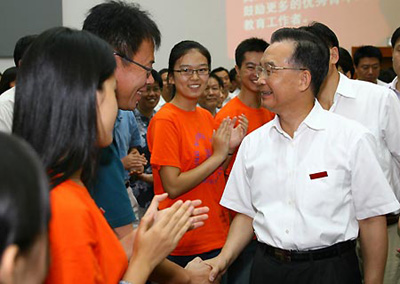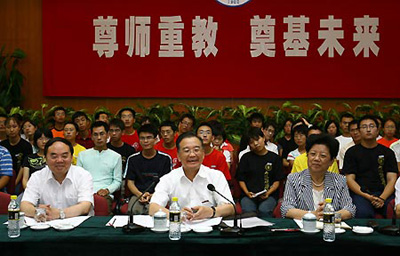| Home / Education / News | Tools: Save | Print | E-mail | Most Read |
| Wen Stresses Importance of Education |
| Adjust font size: |
Premier Wen Jiabao said yesterday that "though our country has made great economic and social progress in recent years, the development has not been even. We have to improve the education system in rural areas to ensure every child goes to school".
Chinese Premier Wen Jiabao (R) shakes hands with a freshman at Beijing Normal University in Beijing, capital of China, Sept. 9, 2007. Premier Wen visited teacher-training freshmen who are offered free education and held discussions about teacher training with them at Beijing Normal University on Sept. 9. Talking to faculty members and students of Beijing Normal University on the eve of the 23rd Teachers' Day, Wen said: "The practice of providing free education to normal students in six universities is aimed at making society pay more respect to teachers and their work." Wen, accompanied by State Councilor Chen Zhili, attended a colloquium at Beijing Normal University. He greeted the hundreds of faculty members and students at the seminar. Wen encouraged students from underdeveloped areas to serve their hometowns after graduation so that more children could receive good education. The premier's call becomes all the more important because poor pay and working conditions in primary and middle schools of backward areas have created a serious shortage of good teachers, and this fact will be in focus on the 23rd Teachers' Day today.
Chinese Premier Wen Jiabao (C Front) holds discussions about teacher training with teacher-training freshmen at Beijing Normal University in Beijing, capital of China, on Sept. 9, 2007. Premier Wen visited teacher-training freshmen who are offered free education and held discussions with them at Beijing Normal University on Sept. 9. Also in the spotlight will be retired teacher Feng Zhiyuan, thanks to a recent movie that recounts his story. The film is creating waves on the big screen across China. Feng, now in his 70s, resigned from his cozy teacher's job in Shanghai in 1958 and traveled all the way to a poor village in Zhongning County in northwest China's Ningxia Hui Autonomous Region where he taught for 42 years. Feng kept teaching for five years even after being stricken with blindness. But teachers like Feng are difficult to come across nowadays because poor pay and working conditions are driving more teachers toward the cities. A recent study by Jianghan University in Wuhan shows teachers are most unsatisfied with their low income. The average monthly income of a teacher in rural areas is less than 800 yuan (US$106) and that, too, is not paid on time. Sixty percent of the country's more than 11 million teachers work in rural areas. The study covers hundreds of rural schools in 22 provinces and autonomous regions. Education budgets of local governments in rural areas have been shrinking in recent years, with teachers' salary arrears crossing 10 billion yuan (US$1.2 billion) a year. (Xinhua News Agency, China Daily September 10, 2007) |
| Tools: Save | Print | E-mail | Most Read |
 |
| Related Stories |
|


